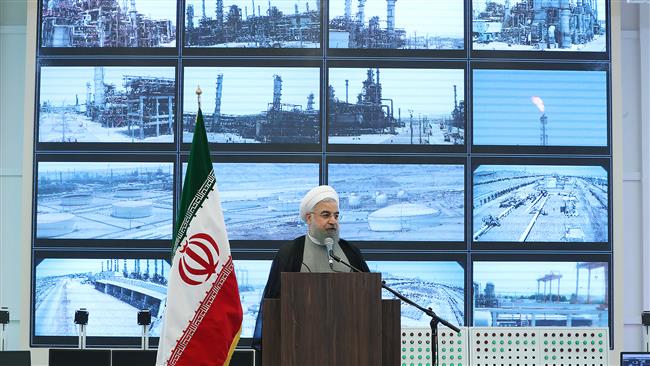Pursuing re-election in a May 19 vote, Iran’s President Hassan Rouhani has denounced critics of the July 2015 nuclear deal between Iran and the 5+1 Powers.
Following up his warning of a return of “extremism” in Iran — a challenge to sections of the Iranian regime as well as conservative and hardline Presidential candidates — Rouhani said on Monday, “Some people begin quarreling just after an administration is elected. This shows that they do not know the rules of campaigning for the election.”
Opening a big refinery initiative in the southern Iranian port city of Bandar Abbas, Rouhani proclaimed the nuclear agreement as a “national project” in all Iranians could make use of the new political atmosphere for economic recovery:
“So it is expected that after the election, people from all walks of life and all groups help the elected person manage the [country’s] affairs.”
Rouhani’s leading opponents, cleric Ebrahim Raisi and Tehran Mayor Mohammad-Baqer Qalibaf, claim that the Iranian economy is still in decline despite the nuclear deal. While the Government has reduced inflation from more than 45% to less than 9% since 2013, unemployment is still rising and growth — more than 7% in 2016 — is heavily dependent on increasing oil revenues, a recovery which will be limited by an OPEC price cap and lack of foreign investment in Iranian oil and gas fields.
The President took aim at sections of the Iranian regime — the Revolutionary Guards, the judiciary, and even the Supreme Leader’s office — on Saturday with the proclamation, “We will not let them bring the security and police atmosphere back to the country. Iranians will prove to the world at the May 19 election that the era of violence, extremism and pressures in our country is over and Iran is pursuing the path of reason.”
Yesterday he was conciliatory, praising the Revolutionary Guards’ role in “stabilizing” the 1979 Islamic Revolution, protecting the country, and “supporting the oppressed people of Muslim countries such as Iraq, Syria and Lebanon”.

